
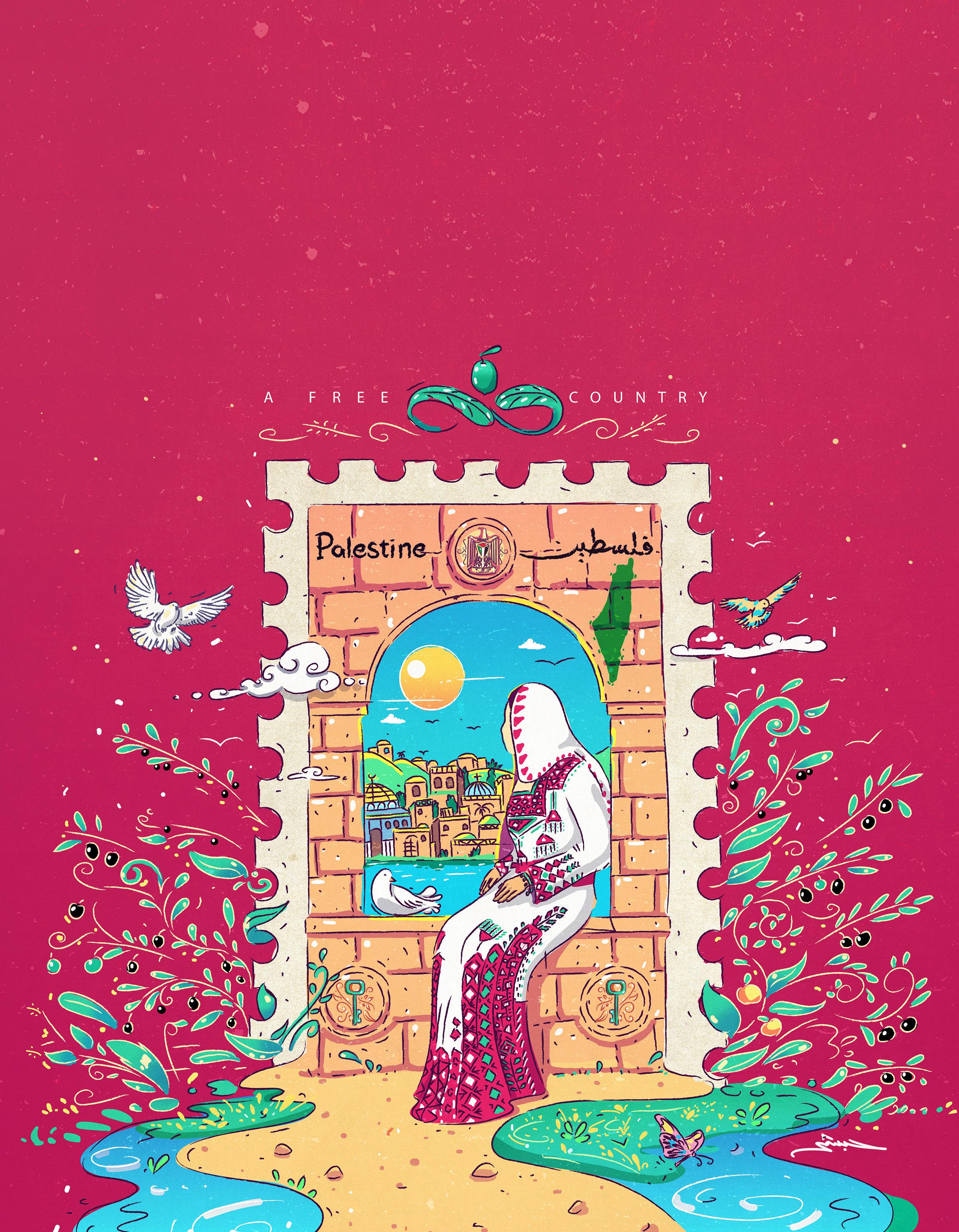
1 Volume 8 - Issue 1 March 2024
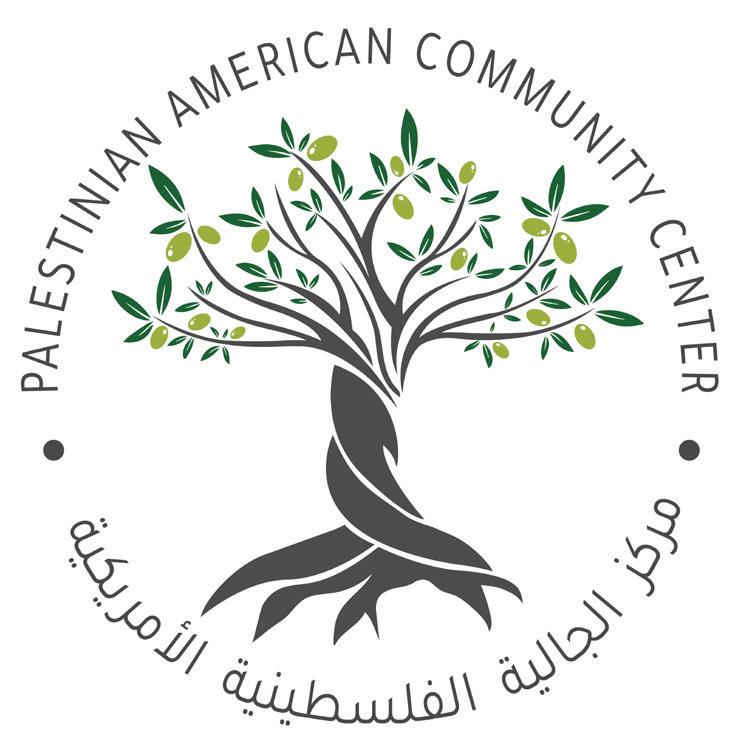

Falastin Staff
Editor in Chief, Basma Bsharat
Arabic Editor, Fadia Alagha
Copy Editor, Marwa Elessawy
Layout Editor, Fadia Alagha
Advisors, Rania Mustafa & Reem Farhat
We would like to extend a special thank you to Ahmed Elhabashy for the artwork used in this issue’s cover. You can find more of his work on his Instagram page @ahmed_ali_elhabashy.
Captioned “Palestine is a free country,” Ahmed designed a perfect embodiment of what we envisioned for this issue. Palestine is and has always been free, no matter how much the Israeli occupation attempts otherwise.
973-253-6145 388
Lakeview Ave Clifton, NJ 07011
paccusa.org info@paccusa.org
Table of Contents
When I Think of the Future of Palestine Scars of An Erased History
I’m Black and Palestinian, you scared?
From the River to the Sea, Always was and Always will Be
Abdullah Aref
Karim Wafa
Azmera Hammouri-Davis
Tasneem Abdulazeez
The Deeper Meaning of Gaza’s Beach: Why Gaza’s Beach is Unparalleled
The Future
We Will Free Palestine Connection to the Land
As Palestine Bleeds
To the Gazan Boys Playing Soccer and Laughing
Oh My Palestine Spoken Word
Palestinian American Community Center Honors Wael Al-Dahdouh
Mama
SJP Student
Alaa’a Ashkar
Sahar Abdulazeez
Lamia Abdallah
Sibghatullah Khan
Meredith Howe
Ola Alhamayel
Sheikh Ubaid
Basma Bsharat
Rewa from Gaza
ةنعل
برحلا
11.
15.
18. 19. 20.
06. 08.
14.
16.
22. 24. 26. 27. 28. 30.
يلع وبأ ةريمأ
Letter
from the Editor in Chief and Palestine Education Director
It is hard to believe that we are on month five of this ongoing genocide against Gaza. As we mourn the horrific and tragic losses we have been witnessing on a daily basis, we continue to advocate for an end to Israel’s crimes. As easy as it can seem to fall into despair, the adamant refusal of the people of Gaza to give up serves as an inspiration and a motivator for all of us. We bear witness to a people who are being murdered and targeted, their homes destroyed, their lives threatened constantly- and still, they continue to find ways to live. They refuse to give in or to give up. We owe it to them to do the same. It is this reminder that sets the tone for this issue’s theme: The Future is Palestine.
As devastating as everything has been, we have also seen unprecedented support for Palestine. Within my lifetime alone, I have witnessed how drastically public awareness on Palestine has shifted. There has been a change in everyone; priorities have shifted, worldviews have changed- the world is waking up, and it is because of Palestine. For us to carry this new world to fruition, we must all hold close to the firm and solid conviction that Palestine will be free, and that the future of this world that we live in can only become better and see true justice with the liberation of Palestine. As so many have said, “We’re not freeing Palestine. Palestine is freeing us.” For this issue, we asked contributors to truly and tangibly imagine what the future will look like in a free Palestine. In a world with a free Palestine. To do so in itself is an act of resistance and activism.
The work in this issue was submitted by members of our community of all ages, many including youth. We are proud and grateful to all of those who trusted us with their work. We are grateful to the PACC board for always supporting our vision for Falastin, and we thank every sponsor who contributes to the success of this project. We are so grateful to PACC and the community for trusting us with the task of this immensely important work. Lastly, thank you to the readers who, without your support, would not make Falastin what it is today.
Basma Bsharat Editor in Chief of
4
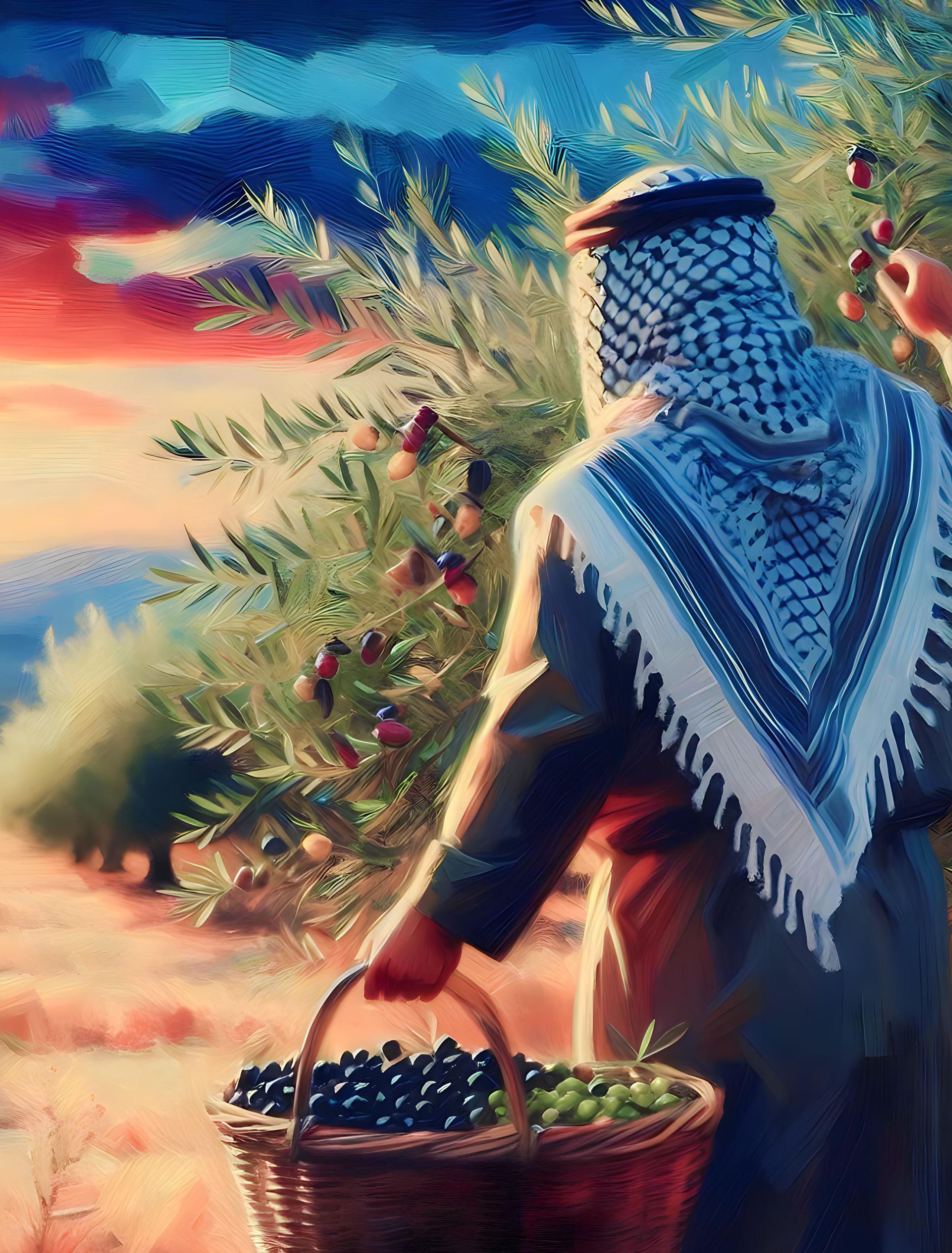
5
@bodez.art
Artwork
by BodezAart IG:
When I Think of the Future of Palestine
Abdullah Aref
When I think of the future of Palestine, I hear the birds chirping peacefully. I think of a world where Palestinians are no longer woken up by sudden bombs and loud army vehicles driving by. I think of a world without the constant sound of drones. I hear the adhan over the masjid speakers, so loud and fearless like they once used to be.
When I think of the future of Palestine, I think of a world where we always know that there is food at home. I think of a world where we don’t have to worry about our next meal. I think of a world where basic human needs are met.
When I think of the future of Palestine, I smell the aroma of freshly baked bread made by our loved ones. I think of a world full of large supplies of flour. I smell the pastries made tirelessly by my mother and grandmother and hear the adhan that wakes me up from my slumber.
When I think of the future of Palestine, I think of a world where we can live without curfews. I think of a world where we don’t fear going outside or getting gas for our cars.
When I think of the future of Palestine, I think of the late nights my cousins and I will have where we will talk all night while eating sunflower seeds from the corner store. I think of a world where Palestinians still have cousins alive to turn to, and a world where there is no longer any pain and sorrow. I think of all the baby showers and weddings Palestinians would have instead of funerals.
When I think of the future of Palestine, I think of picnics among our olive trees instead of the tree stumps where they used to be. I think of
the surviving trees that our ancestors grew before us, and spent their whole lives protecting.
When I think of the future of Palestine, I see children dancing in the streets instead of worrying about checkpoints around the corner. I think of how children are courageous enough to keep on living with smiles on their faces despite everything they have been through.
When I think of the future of Palestine, I imagine all the hard work there is yet to be done. I think of Palestinian homes being rebuilt instead of Israeli red rooftops creeping in. I think of how Palestinians will help each other to rebuild in the same way that they helped to dig each other out of the rubble.
When I think of the future of Palestine, I hear the sheikhs call over the masjid’s speakers, “The war is over,” as the streets flood in celebration. I see planes flying full of Palestinians who are finally returning home. I see photos and videos of people reuniting online. I see the borders of 1948 come down and Palestinians thriving in places they could never go to before.
When I think of the future of Palestine, I think of a world where injustice is replaced with rejoicing.
6
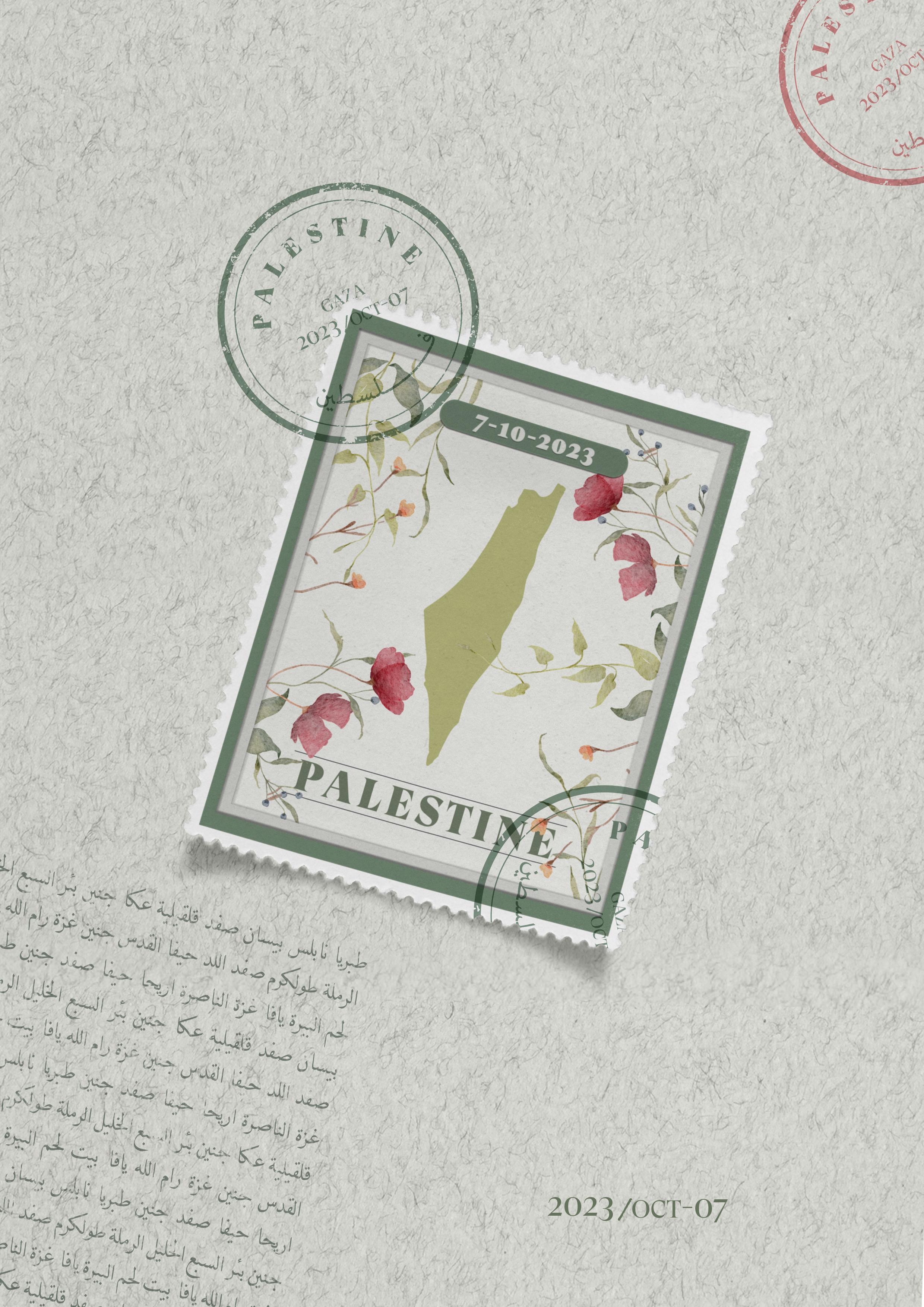

7
Artwork by Abdalla IG: @abdalla380
Scars of An Erased History
Karim Wafa
1. quiet something is coming boats from afar a foreign-looking man has set foot on our land he made us close our eyes and pray to thank the Lord that we have been saved we open our eyes and nothing is ours anymore we have lost everything so i ask this foreign-looking man: you say that we have been saved saved from what?
2. crimes. conquests. colonialism. all done in the name of civilisation with a sprinkle of peace and democracy let us not forget the secret ingredient: human rights
3. dear homeland of my ancestors, i miss you
it’s been a long time since we spoke my grandma always tells me stories about how your air is the cleanest your waters the freshest and your people the nicest i no longer know what to say you’ve been betrayed by the world and what’s worse is that they blame you for suffering they want you to stay quiet and never speak time will reveal their true colors in the end i know we will be victorious and i’ll be able to place my hand on your soil kiss the graves of my elders and bow down to the holy shrine of the blessed city but until that day comes
i’m still a lost soul in exile betrayed by the world just like you
4. maybe if the colour of my skin was lighter or my features a bit finer the world would have saved me and my people but we are too ethnic for this world too indigenous too ancient too authentic that is what they are trying to erase our history
5. they call us barbaric when they are the ones who turned our skulls into cups our bodies into bridges our deaths into medals our homes into theirs our streets into graveyards our freedom into a threat and our nation into a wasteland tell me again who is the real barbaric one?
6. we care for the land they destroy the land we water the plants they burn the plants we kiss the earth they pillage the earth we teach life they teach death
7. they destroyed and conquered and stole and pillaged *Continued on page
8
10

9
Artwork by Mostafa Mahdy IG: @mostafamahdyo
in the name of civilisation but we have always been barbaric? we are here to tell you no more you want the truth? i’ll give it to you we have been the civilized you have always been uncivilized civilize yourself before you preach what you are not
8.
the colonizer sent bombs they took our children and sent them to the skies i can still hear their cries but i can no longer answer them they are with the ancestors now my soul is shattered. i miss them please bring them back please…
9. they say that the dead are found in graveyards in peace but not in my land for the colonizer has prevented even those who passed from being at rest so be careful where you walk when you visit my land because you’ll find the dead in the streets, rivers, mosques, churches homes, schools, and every other place we are a nation of martyrs and our land has become a graveyard
10.
let me tell you about my people we are not who you think we are you have been made to believe that we are evil and barbaric to prevent you from discovering the truth our people are as gentle as the spring breeze our people are as kind as a mother’s tender love
our children are the purest souls you will ever see our women are the pillars of our nation our men are warriors blessed with the powers of the ancestors our trees are ancient going back thousands of years our river waters flow like the love in our souls they told you we were evil to prevent you from seeing who we really are
About the Author:
Karim Wafa, also known as Karim Wafa Al-Hussaini, is an Indigenous Palestinian poet, historian, writer, speaker, educator and lecturer of mixed heritage. He is a historian of the African Diaspora, with a specific specialization in African American history, and of the medieval Islamic world. His poetry reflects his ancestry, culture, heritage and Indigenous identity, as well as chapters of history such as colonization. He has risen to international fame due to his writings on his ancestral homeland, Palestine, following the ongoing genocide in Gaza which began in October 2023. His family roots lie in Gaza and Jerusalem.
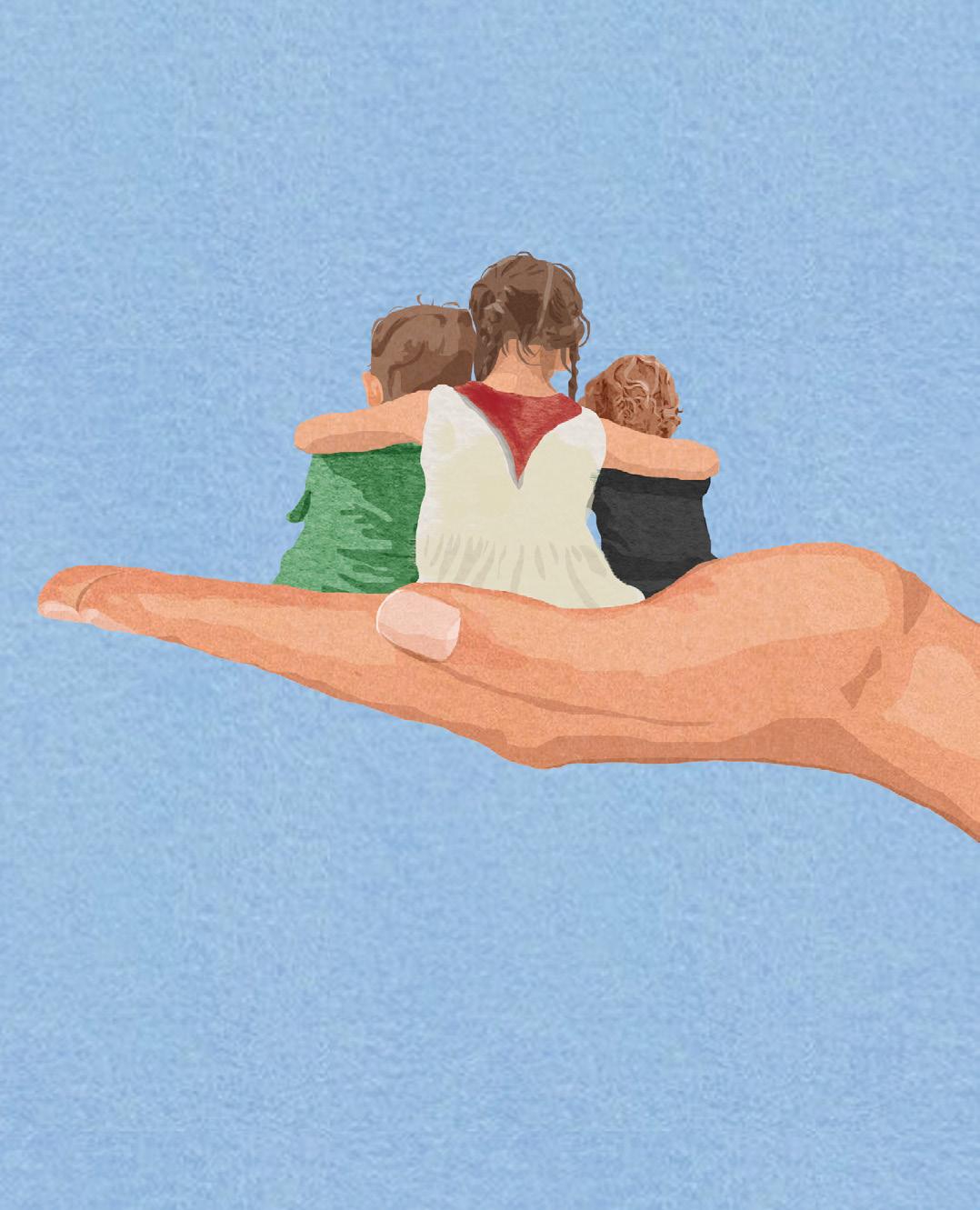
Artwork by Alev Neto
IG: @alev.neto
10
I’m Black and Palestinian, you scared?
Azmera Hammouri-Davis
I did not learn much about my Palestinian heritage growing up, but a trip to Palestine as an adult exposed me to the beauty of Palestinian culture and the racist realities of life under Israeli occupation.
Growing up in Hawaii, even though one of my last names was Palestinian, I never meaningfully learned about or connected with this part of my heritage. Mom’s father, Grandpa Marwan, was someone I mainly learned about in her lyrics and songs. His early death when she was fourteen years old exacerbated this cultural chasm, leaving many pieces of the Palestine puzzle to be woven together. Eventually, remnants of his culture would etch their rightful place into my halcyon memories, but never without the painful awareness of how clueless I was about the context. Like many, Arab stigma post911 dissuaded me from learning about the political realities in the region. When the opportunity to learn about Palestine presented itself in graduate school, I couldn’t let it pass me by. As a first-generation low-income college student of Black-Palestinian
American descent, I saw how education opens portals of possibility my ancestors could only dream of. Getting to travel there and learn about Palestine first-hand was a once-in-a-lifetime experience.
In 2019, after spending the first three weeks of January in Palestine as part of my Master of Theological Studies program, it became clear that I needed to learn more about my maternal side of the family and interrogate my own cultural and religious assumptions. That summer, I returned for two months to learn and teach alongside students and staff at the Ramallah Friends School in the West Bank. I enjoyed teaching English literacy to 4th graders and promoting cultural identity through the Afro-Brazilian martial art of Capoeira. Seeing the young women move their bodies freely and express their voices reminded me of the freedom Capoeira gave me as a young girl.
I revisited Aida refugee camp, saw my grandfather’s land for the first time, camped in Jericho, spoke with
*Continued on next page

11
Azmera Hammouri-Davis, center, outside of the African quarter in Jerusalem, Palestine 2019
Afro-Palestinians, listened to stories, and met some incredibly resilient, beautiful, warm, and loving people. They were going about their everyday lives, in all its complexity, seeking the same peace and liberty that I saw quotidian folk pursue at home—the exact antithesis of what U.S. news predominantly portrays about the “Arab trope” in the States. I met Palestinian Christians and Muslims and even learned about Palestinian Jews from the same town my family is from—Al Khalil, known today as Hebron. All I had heard in the media growing up was narratives propagating skepticism about how Arabs, especially Palestinians, are perpetual foreigners or terrorists. Whether it was hearing slurs like “desert n**g*” or watching Aladdin, these stereotypes promoted selfhatred and xenophobia and were couched in harmful Orientalist portrayals to say the least.
In high school, my favorite teacher was a white Jewish male. He taught AP English at James Campbell High School. I loved the structure, autonomy, and ethic of humor he espoused in his class. On the first day of class introductions, I’ll never forget how impressed he was when he learned I practiced Capoeira. I was amazed that he knew what it was and had also tried it before! I appreciated that he seemed to expect more from us. Though his tough love approach and strange tactics rubbed some folks the wrong way, it somehow motivated me to apply myself to the material. I wanted to prove him wrong, and I wanted to learn more from him. So much so that I became his teaching assistant during my senior year. I’ll never forget when he signed my yearbook and wrote, “I’m so glad I’ll no longer have to live in fear every day that you’ll bomb the buildings.” I had no idea what he was talking about. Why would he say that? It caught me so off guard, and I just laughed it off. This was one of the first times I realized that having Palestinian heritage in America was deemed dangerous. Given that I had little context then, I minimized my discomfort and chalked it up to his facetious personality. When my mom got mad, I told her she was overreacting. He didn’t mean any harm by it; I contested her on his behalf. So quick to protect his intentions and overlook my own feelings. It wasn’t until coming to grad school that I realized how much I internalized that “joke.” Will
other people automatically assume I’m some terrorist or that I’m colluding with some “ominous radical group” if I speak out on the injustice I witnessed in Palestine?
Or worse, the usual and all too recycled gaslighting tactic, will they deem me “antisemitic”?
It didn’t dawn on me until I was being arrested at Ben-Gurion airport seven years later while leaving the country how gravely insensitive my teacher’s “joke” really was. I was detained for an hour (most Palestinians are held for even longer), strip-searched, patted down, and interrogated prior to boarding my flight. My crime? Having a Palestinian grandfather.
When I realized that this blatant racism is a common practice designed to discourage those in the diaspora from returning, I was devastated. Not unlike most Palestinians, I was classified as a “security threat” to justify such blasphemy. While being held inside of an airport is different from being targeted by police on the streets, I couldn’t help but think about how similar this discrimination was to that of Black people who are racially profiled in the States. I was traveling with three other Harvard colleagues; one was a white American Jewish woman, another a Black Guinean woman, and a Latinx male. Of our group, I was the only one stopped, frisked, and detained. When I asked the airport officer why I was being mistreated, I received a glaring stare followed by the cold statement, “This is Israel, what do you think?” Excuse me for even asking, I thought to myself. I was made to feel delusional for expecting anything different. How naive of me.
My white American Jewish colleague witnessed the entire escapade. I could sense she was anxious about the ridiculous circumstances but must not have had language for naming any of her discomfort because outside of the remedial “Are you okay?” immediately after, she never said anything to acknowledge this structural and direct injustice. I’ve come to expect feigned concern now, but at the time, I was baffled. Rather than follow up afterwards to at least see how I was faring, she chose to remain
12
silent. So many people do, and can I honestly say I’m surprised? Those who benefit from hegemony have little incentive to denounce it.
If we had to rely upon people with privilege to speak out against injustice, would any people of color be here today? I know I wouldn’t. Martin Luther King reminds us that progress never rolls in on the wheels of inevitability. Coretta jumps in and says freedom is never really won. You earn it and win it in every generation. Oppressors don’t want the oppressed to speak up, and so we do.
Truth is, whether I speak or choose to remain silent, people still may or may not pigeonhole me into all those categories; false depictions that rip apart the spirit rather than honor our collective humanity. Audre Lorde reminds me that my silence will not protect me. It never protects any of us. I’m so glad that my ancestors did not remain silent so that I can be here today.
I don’t claim to know what it’s like to grow up under military occupation, have one’s house demolished, or the struggle of having one’s water and electricity intentionally cut off by the government at random hours of the day. I don’t speak Arabic skillfully (yet) and can only hope to learn how to make some of that delicious food. I acknowledge there are certain privileges tied to owning an American passport, but those immunities render themselves insufficient when it comes to race. I also know I have a responsibility to speak my truth. Suffering in silence helps no one and prevents us from having the necessary, albeit difficult, conversations with people in our own lives that can yield possibilities for creating change.
Sadly, my teacher passed away during the pandemic, so I never got to tell him how his joke really made me feel. May this writing serve to quell any future silences that dare lurk.
Republished from: https://mondoweiss.net/2023/05/imblack-and-palestinian-you-scared/
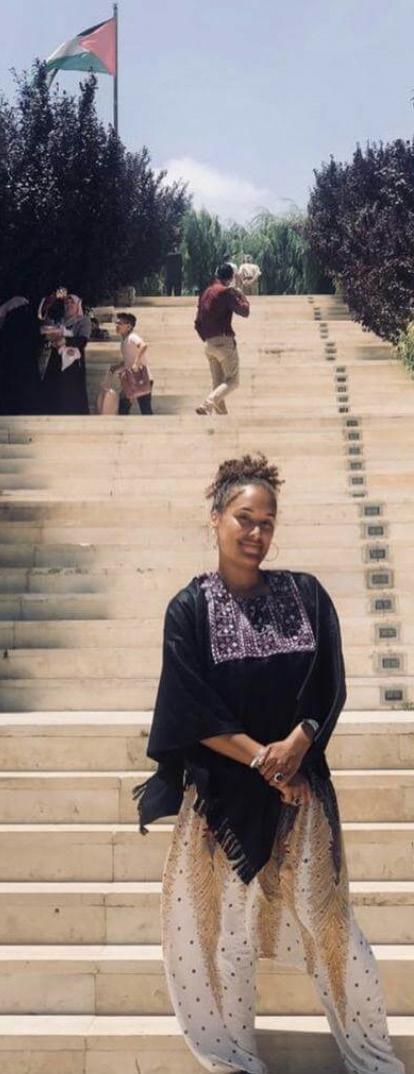
13
Azmera Hammouri-Davis outside of the Mahmoud Darwish Museum in Ramallah, Palestine 2019
From the River to the Sea, Always was and Always will Be
Tasneem Abdulazeez
From the river to the sea, Palestine will be free, From the airstrikes of the oppressors, And the ruthless attacks of the aggressors.
Buildings collapse, and people try to escape, All the bloodshed can paint a landscape. Mothers scream their children’s names,
As they search for bodies between the flames. Fathers collect their children’s scattered limbs, Looking for the names etched into their skins.
Bodies trapped under the rubble, Did their resistance really cause all this trouble? Do they deserve to be buried in the masses, Or burned alive from the phosphorus gases?
Are they not human like the rest of us, Or is the value of their life something we must discuss? Why is fighting back now called terrorism, And calling out hatred is considered antisemitism?
People worldwide are gathering like never before, Chanting and questioning the government, how many more? How many more do we have to lose? How much longer will you censor the news? This has become a question of humanity. With all the bloodshed and genocide, have you lost your sanity?
They are not numbers, they are people too, Palestinians are Muslim, Christian, and Jew. A people with culture and history, Their resilience and faith, a true mystery.
Since 1948 until today,
They have stood their ground and fought to stay In the land and the soil that was always their home, Which houses the olives, oranges, and golden dome.
Our calls for freedom will continue to erupt, The Palestinian blood was not made to give up. From the river to the sea, Always was and always will be.
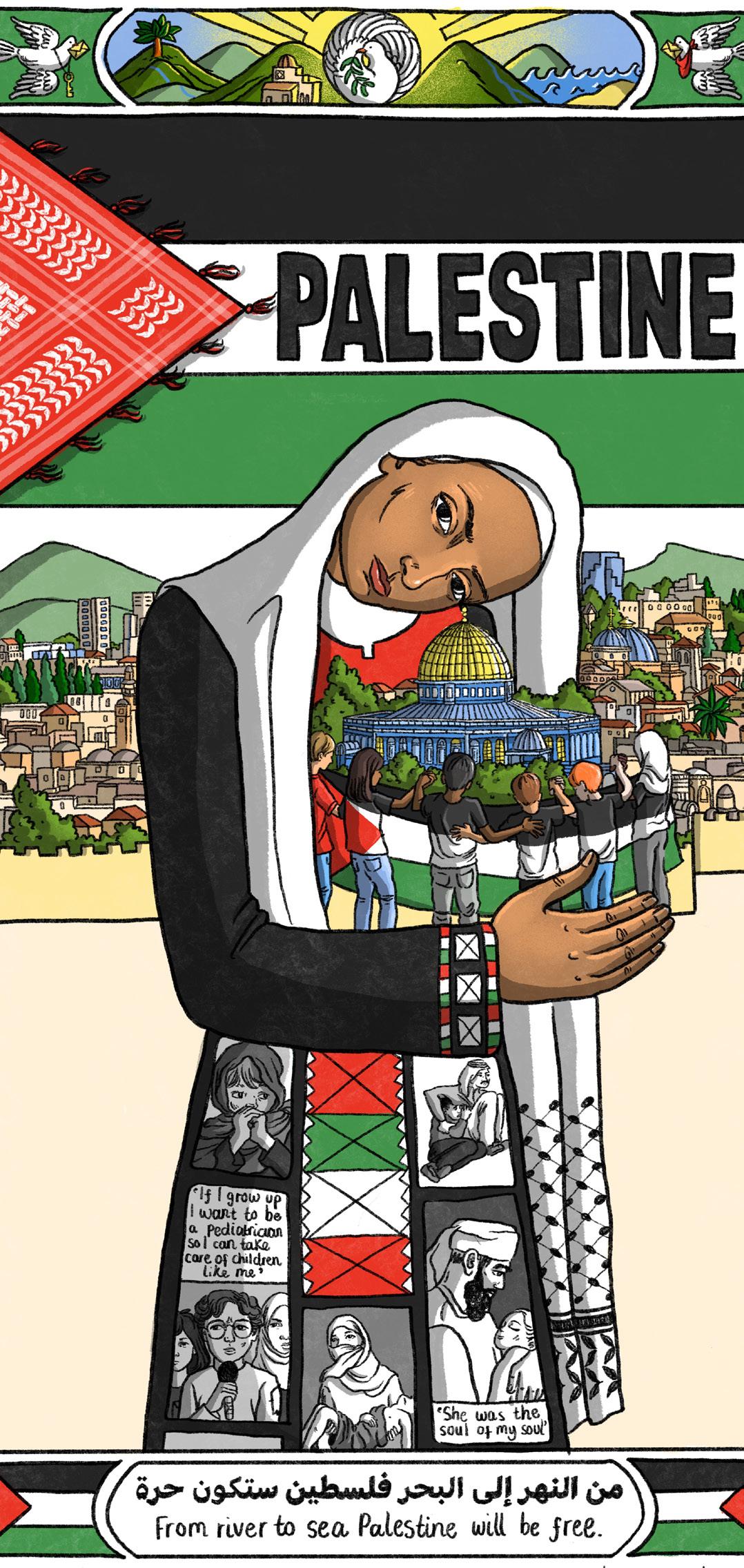
14
IG: @esmechapmanillustration
Artwork by Esmé Chapman
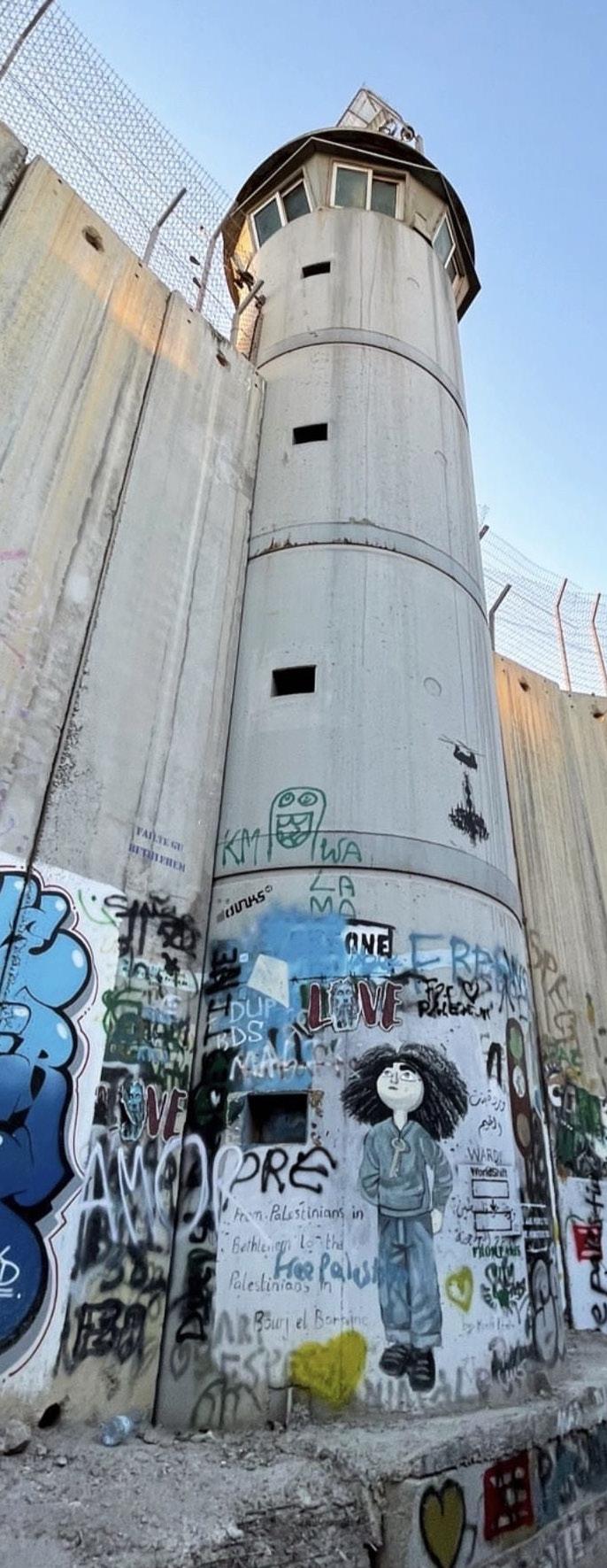
15 برحلا ةنعل يلع وبأ ةريمأ فنصن انتلعج اهنأ برحلا هذه تانعل نم كلانه ، كلذل اقفو اهعم لماعتنو اننازحأ ىلع ؟كل اقيدص دقفت نأ ينعي اذام ،لقأ نازحأو نزح لقلأا ريخب كلهأ ىلع ؟ كتلئاع دارفأ دحأ دقفت نأ ينعي اذام اربقو انفك دجو لقلأا هوجولا تارشع بهذت نأ ينعي اذام نم وحاترا ؟ ارارم اهتحفاص دايآو ةفولأملا ةمداقلا لاوهلأا برش دق لقلأا ىلع احلام ءاملا برش نم اظعاوم حبصت يتلا صصقلا نم ريثك اذكهو ةنيزح ىقيسوم اهقفارتو لقأ ةعجافلا نأ لاجخ ءاثرلاو نزحلا لجؤت ىرخأ نم ، كلتق يف ئطاوتم ملاع مامأ كدحو كنلأ رايهنلإا لجؤت ةيعيبط ةايح ديري وهف هيلع لقثأ ءبع نم ررحتي ، كمللأ اهيف دوجو لا ناميلإا لاإ كلمن لا ماكرلا تحت هلهأ عوجفملا دجيل تقولا يتأي امبر امبر ،، ءاكبلل تقولا يتأي امبر
Apartheid Wall at Qalandia Checkpoint
Picture taken by Ameera Abouali
The Deeper Meaning of Gaza’s Beach: Why Gaza’s Beach is
Unparalleled
Students for Justice in Palestine, Rutgers New Brunswick
Growing up as a Palestinian from Gaza, Baba always took us to the beach. Every vacation consisted of us going somewhere hot and cooling off in the salty water. The truth was the beach we were trying to reach was an ocean away, with borders difficult to cross. During our road trips to our beach destination, Fairuz’s voice was clear but abruptly paused every five seconds by Baba to question whether my siblings and I understood every word.
“Yallah, repeat, translate, and explain,” he would say. For those unfamiliar with Fairuz, she is the Leventene queen of the hearts of the Arab people. Her beautiful voice and music were not just lyrical genius but personal to us. Her most famous album, “Jerusalem in My Heart,” resonated with every Palestinian living in exile or under occupation. Our road trips with Baba teaching us Arabic through Fairuz’s poetic music and singing about returning to our homeland, as we headed to the beach, was our form of resistance.
Gaza is known for many things, but above all, is known for its beach. It is our pride and joy,
considering the occupation has stolen so much from us, but “at least we have a beach” is what we often tell ourselves. Israeli settlers have designated themselves as experts in stealing; if they could carry our sea and take it for themselves, they would. The occupation has restricted our movement, thus restricting our freedom, so all Palestinian Gazans are familiar with is their land contained within the 365 km2 open-air prison. Especially during the hot summers with the power outages (due to the 17year blockade), the beach is seen as our only escape. Palestinian Gazans look to the horizon and wonder if they can only fly to escape the borders.
As a Palestinian-American, I did not realize how much the borders kept us apart until I encountered other Palestinian-Americans, and the topic of swimming came up. I was surprised to hear they either did not know how to swim or did not do it often. In response, I would ask, “How can you not when you’re Palestinian?”
And that is when I remember that my Palestine is not everyone’s Palestine. Walls, checkpoints,
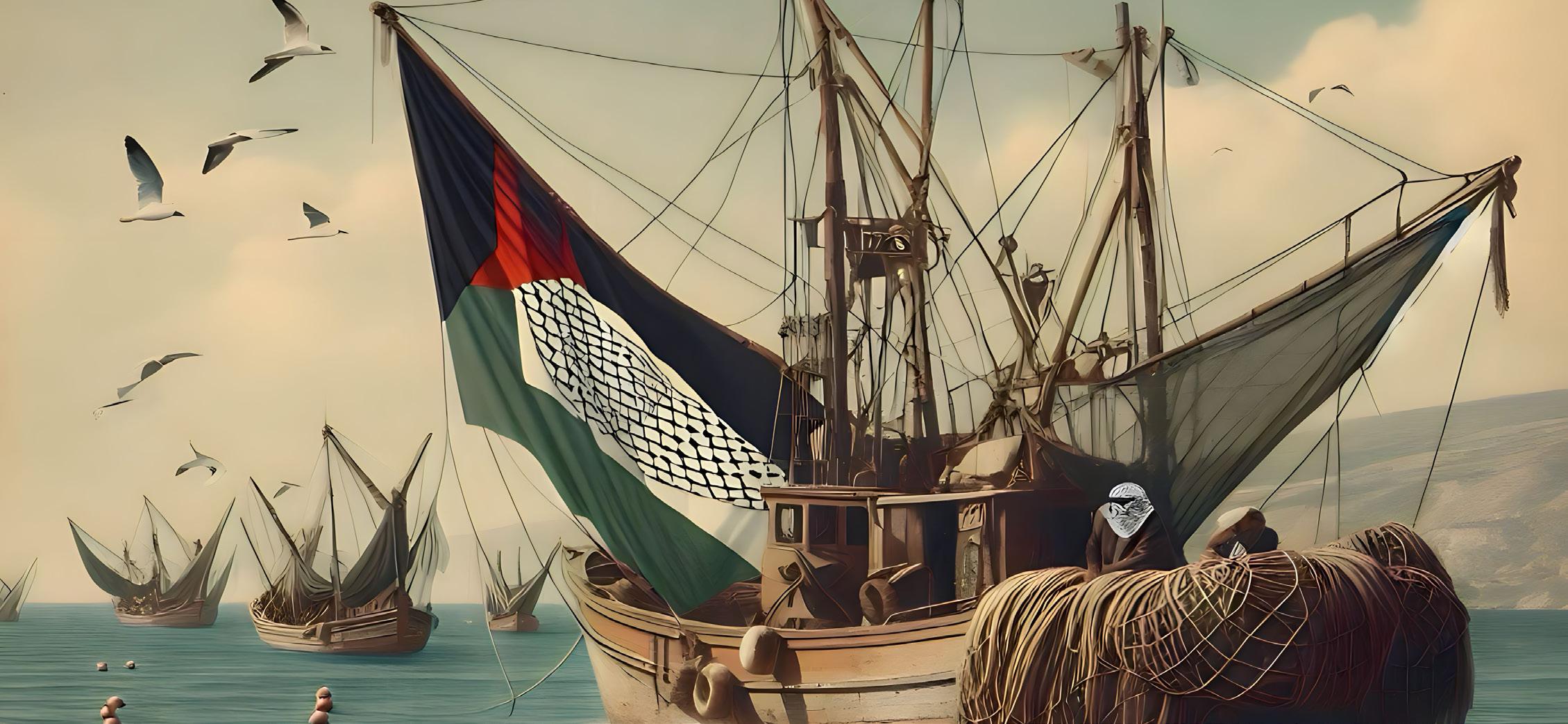
16
by BodezAart IG: @bodez.art
Artwork
barricades, and borders separate us into enclaves, with those who grew up living under occupation or exile being unfamiliar with the other side. The notion that we, Palestinian Gazans, live on the “wrong side of the border” becomes more evident. Most Palestinians you meet in the US are from the West Bank, where the beach of Yaffa is not too far away, but Israeli Occupation Forces (IOF) make it impossible to reach.
To make matters worse, on my recent visit, after being separated from my family for nine years, I couldn’t wait to get back in the water, just like old times. But I was immediately alerted that I could not swim without the risk of getting sick due to Israel’s sewer dumpage. Simply passing by certain parts of the beach coastline is unbearable because of how bad it smells. What was once blue water is now a murky brown. The tap water is so salty that whenever you wash your hands, make wudu (ablution), or brush your teeth, my family jokes that you feel like a fish will come out of your mouth. Indigenous people would never harm their land like settlers do. This is a crime against humanity.
It is day 104 of the ongoing Palestinian genocide, and Gaza has become unrecognizable to many of us due to its destruction. It is critical to understand the significance of Gaza’s beach to know how hurtful it is for Israeli soldiers to be seen raising the Israeli flag, singing their national anthem, and posing on Gaza’s beach. The intentions of the state of Israel have been clear from its creation: to eliminate the Palestinian people and their history. They want us to forget, but 75 years later, we still dream of liberation. Despite the ongoing ethnic cleansing, occupation, apartheid system, and increase of settlements, the irony remains that when they removed our country from the map and renamed it with a state I do not recognize, Palestine never left, since the Israelis failed to replace it.
Soon, we will return to the beach of Gaza in our swimsuits, snacking on bizr (watermelon seeds), drinking mint tea, listening to Fairuz, and playing shada (cards) all at the same time.
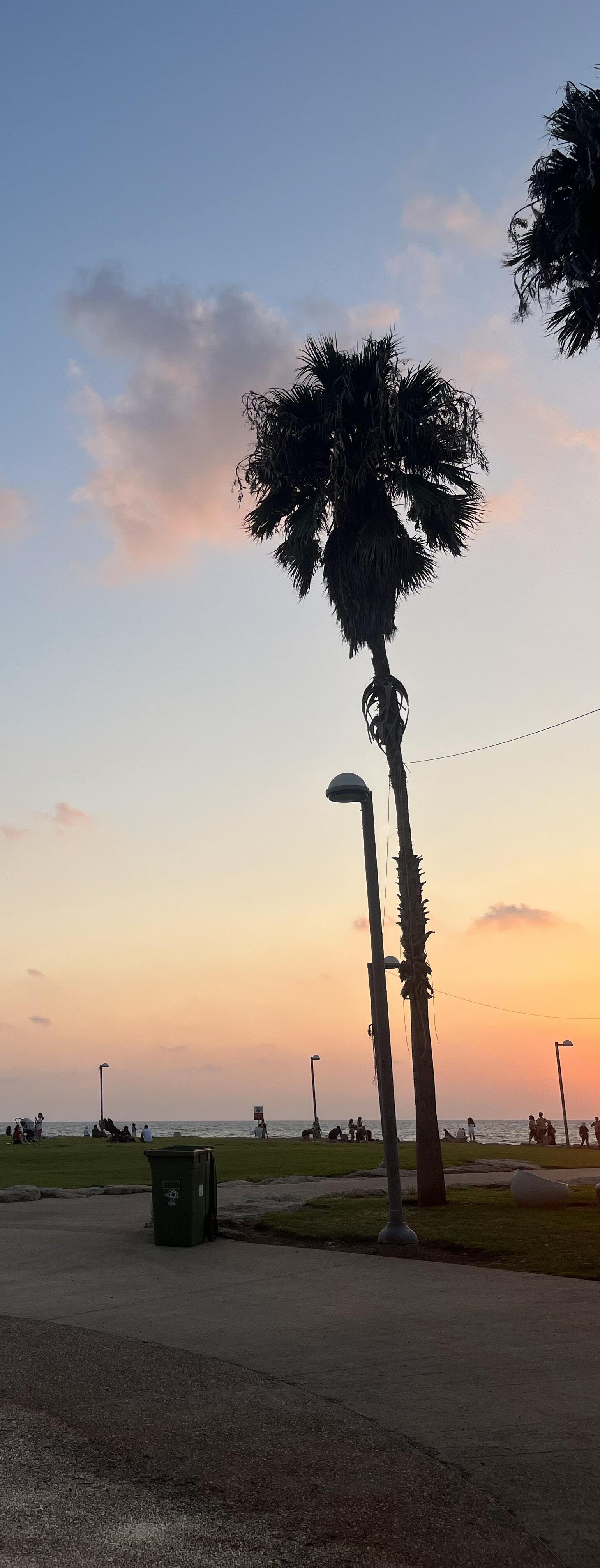
17
Akka - Occupied Beaches
Picture taken by Basma Bsharat
The Future
Alaa’a Ashkar
The sun will rise again, its beaming golden orb overpowering, the towers clashed like jenga pieces crashing, or the silent corpses still like statues, or the brave children, brave men, brave women, soldiering on and marching stoically to their suffering, left to assemble the pieces of their homes, the pieces that repeat yet another cycle, of tearful restoration, of restitching the family story.
The sun will rise again, glorious like the people.
Never will its rays stop shining, in the darkness.
Don’t forget to see the flag, waving forever high in the sky, higher than the people thought it could ever go.

18
Picture taken by Rania Mustafa IG: @raniamustafa1
We Will Free Palestine
Sahar Abdulazeez
There was once a land of green
This land was named Jenin In this land, there was teen It’s all in beloved Falasteen
And then the settlers came To destroy our lanes Of great food and grains And Great Plains
And then we reunite We come together and fight And then we reunite We come together and fight
We take our lands back and all you ever lack is a heart and humanity and love and sanity
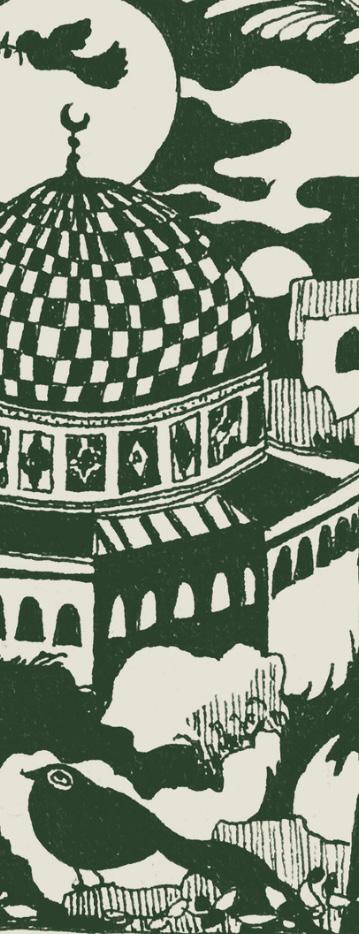
19
by Anir Amsky IG: @anir_amsky
Artwork
Connection to the Land
Lamia Abdallah
Growing up as a Palestinian in America, you’re never told about your identity, your history, your people, or your oppression. You’re told that you’re Palestinian. That’s it. That you’re an Arab. That your ancestors fled from Palestine for a better life elsewhere. You’re never told the reasoning behind why your ancestors fled. Or that they were actually forced to flee. That was, at least, the case for how I grew up as a Palestinian living in the diaspora. I always attended protests and stood beside groups of people that I considered my own, without ever fully understanding the true meaning of what it meant to claim the Palestinian identity. What it meant to truly be Palestinian.
I remember the rush of excitement that I felt as I got off the bus. The first thing that I immediately noticed was the difference in the air. It smelled fresh and like home, the smell of olive oil and khubis wafting through the air, sending an automatic smile to my face, a reminder of Sunday breakfast at my parent’s home. The first place we visited was AlAqsa mosque; my dad had told us it was going to be hard to visit later since we’re from Beit Lahem and going through the checkpoints would be a struggle, even with our American passports. He said we should do it while we were still in Al-Quds, before the checkpoints and harassing questions started. I remember the tears that filled my eyes as I stepped into our holy site that connected my religion to this land. I remember the love and connection that I immediately felt while walking inside the dome of the rock and seeing the beautiful architecture of the dome arch. I remember entering the actual Mosque, the same one that we grew up learning about its beautiful history. I remember the tears as I kneeled in worship, making sujood and asking God for a fun and safe trip, not realizing yet that this trip would change the trajectory of my life.
Leaving Al-Quds was hard; I didn’t know the next time I would be able to visit. Considering this was
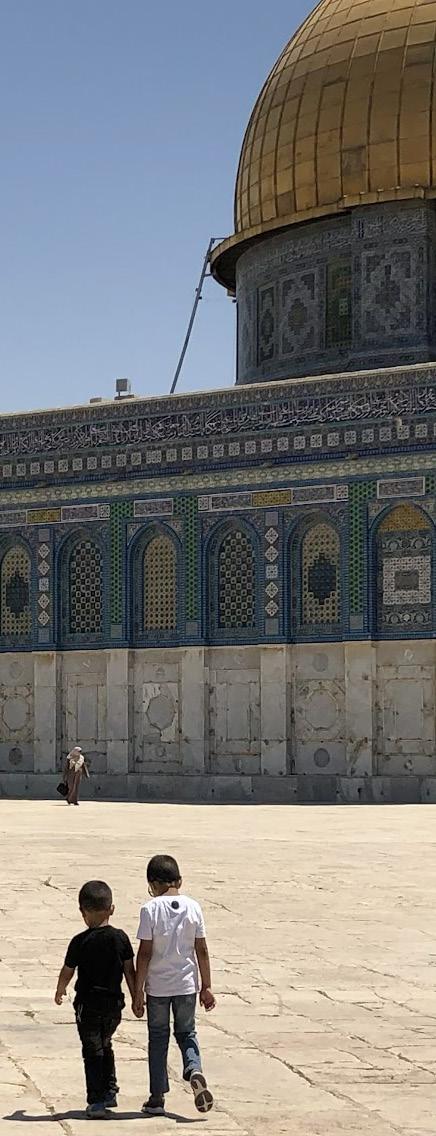
20
Dome of the Rock Picture taken by LamiaAbdallah
my first pilgrimage to a holy site, I had already built a deep connection to this portion of my land. I hadn’t realized at that moment that the connection I was feeling wasn’t rooted in the city itself, but rather something much deeper.
The drive to Beit Lahem was hard. It was filled with screams and fights between my five-yearold niece and two-year-old nephew, videos that I cherish until today. It was filled with songs that spoke in poetic Arabic dialect about watani, dammi falastini, and taj al ras, songs that I didn’t fully comprehend until I was much older. It was filled with disgust and sadness as I watched the New York City-esque structures supplant the supposed green fields that were meant to exist here. Until today, I remember that heart-aching, wretched feeling that I felt whenever I was in America, a feeling of not belonging. As the scenery shifted from tall buildings and American landscape into farmland, olive tree groves, and a tall looming concrete wall, a sense of belonging hit me in the form of tears at the checkpoint into Beit Lahem.
I remember the confusion of my seventeen-yearold self in those moments. Why were these soldiers holding guns to our car? Why did they ask my dad to step outside? Why are they pointing their guns at my niece and nephew? I remember the fear and my urge to scream. After a twenty-minute holdup, I remember them letting us enter my ancestral birthplace.
Those moments were the first time I felt a sense of belonging. While my sisters and I were standing around, tired, my nephew sat on the sandy ground and played with the sand among the sounds of goats, sheep, and cows. I remember the tears that escaped my eyes as my sister smiled, looked at her son, and uttered “He’s connecting with his ancestors. He recognizes his Palestinian connection to this land.” A connection that I started feeling in those moments as the sun beat down on us and the smell of olive trees wafted through the air. I knew I was finally home, as the Palestinian flag waving in the distance came into view.
Growing up in the diaspora, there’s this constant sense of not belonging, of carrying around an unknown political identity that the world wants to erase. But within Palestine, within those two weeks, I was able to reawaken my ancestral ties to the land. By witnessing my niece playing hide and seek with my dad, I witnessed my five-year-old father running around on the land, hiding from his happy father. I witnessed my two-year-old mother sitting on the ground playing with the sand, and my grandma cooking taboon for the family dinner through my nephew, who happily grasped the sand between his five fingers. I witnessed my family’s graveyard, my parents’ dreams in this land, and my love for the connection, linking all of us to Palestine. In those two weeks, I witnessed my true Palestinian identity rise within me.
Growing up as a Palestinian in America, you’re never told about the trauma, the oppression, the restriction, or the death that your family and people go through at the hands of the Zionist regime. You’re simply told that you’re Palestinian. That’s it. That you’re an Arab. That your ancestors fled from Palestine. But when you start asking questions about your identity, you begin unearthing the history behind your existence. You’re told about the Zionists that ransacked your ancestral home and stole your keys from your grandpa. You’re told how even in death, your ancestral graveyard is daily stomped on by IOF boots. You’re told about the exile from Palestine, to the exile from Kuwait. As a Palestinian growing up in America, you are not always told the whole story. Only when you ask, will you learn about the truly beautiful connection that Palestinians have, and will always have to the land.
21
As Palestine Bleeds
Sibghatullah Khan
As Palestine bleeds, munching universals is a crime. How could you stay smug and wise when human cries fill up the skies homes become strange places, and pale ashen doves flying over the Gazan glades do not sing the alphabets of peace; when the indifferent sky plays canvas and sapien blood is spilled in myriad shades?
Art is long, life is short: you cold artist, be a partisan, shun disinterestedness and paint dissent and for once in life live in disagreement. live to fight ‘fore it gets late to die in delight.
Another Strange Meeting
I’m the one you were talking to, my friend. We were on that rusty bench in the park. You had put your youngest in the grave, and you told me, ‘Hope is the thing that flies, sits happy in the soul singing away all lies.’ Misty-eyed, you mentioned the cess of war and truth that stays untainted and bright.
I just wanted to let you know, my friend they searched for our bodies in the dark and buried your right hand in my grave and put mine in yours with mashed flesh. I thought to check with you just in case. Let us sleep now, we’re done with the race.
The Swings
Mother,
we were on the swings, and he said:
I can swing as high
as the moon. Then, after that light and blast, it was completely dark. Where is my brother? I don’t see him, Ma!
He swung real high, as he told you, and went to the moon. It shines brighter tonight, and your brother’s bathed in light.

22
IG: @br1pilo
Artwork
by Pilo

23
Artwork by Jazz Islam
IG: @jazzislam
To the Gazan Boys Playing Soccer and
Meredith Howe
“Let this radicalize you rather than lead you to despair”
- Miriame Kaba
Already much of this writing feels outdated, and yet it’s only been 10- no, 28- no, 103 days. To watch you pass your soccer ball on dusty feet, scoring goals, and blocking passes. Giggling. To watch Gazans caring and feeding each other amongst the debris and terror.
To the barber cutting his neighbors’ hair when the bombs aren’t dropping so, they too can feel love and community and be cared for. To the medical workers who sing their refusal to abandon their patients. To the civilians using their own hands to pull out those trapped and screaming, locked under thick concrete.
I’ve watched a video tonight, of a toddler decapitated from an Israeli airstrike. Their parents waved the body around like a white flag, crying for mercy. Another carrying their son’s remains in separate body bags.
Laughing
A nineteen-year-old, top of her class, old enough to grasp her life and dreams. Now dead. A seven-dayold baby, old enough to lift her eyes to this world and witness her own suffering, not yet old enough to have hopes and dreams. Now dead. A day-old baby, who received her death certificate before her birth certificate.
Children cry for their siblings, mother, father. No child should wish to replace another. The brothers of Muhammad al-Durrah were taken from their father before he could grow old. A child is supposed to die after a parent, not three sons three times in violence.
So many names, so many lives, hopes, dreams, and futures cut off and cut too short, that we can never write a poem that encapsulates you all, and yet we try.
Have you had enough yet?
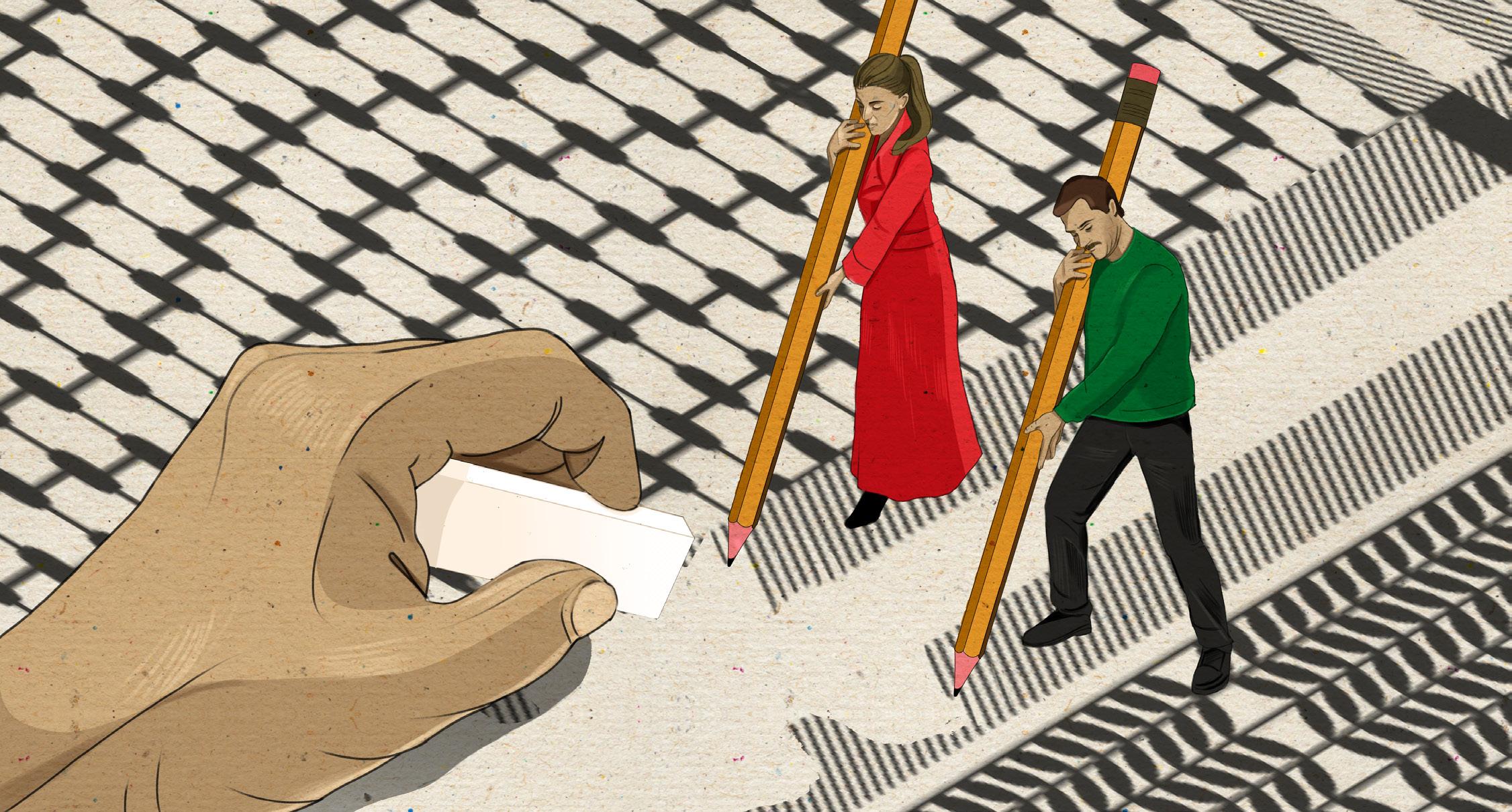
24
by
IG: @aliaa_abou_khaddour
Artwork
Aliaa Abou Khaddour
Is the ground wet enough yet with blood? Has it soaked through the wells to ensure thirst will never be quenched again? Do you think the olive trees will grow back red? I think they might.
I think about the keys to their front doors that families have held onto since the beginning of the Nakba. In the hope of one day returning. The many keys now lay under rubble, clutched in hopeful hands and broken hearts, never to be reunited with their matching lock.
Nothing has taught me resilience like Palestinians. Steadfastness.
Despair is a privilege you don’t get here; hope must be a guest in every room you enter and event you attend. We must keep moving, we must keep trying. We must not stop. I learned that we dance because we must. Existence is resistance and to dance is a joy to hold. So we dance.
My friend once told me of a Zionist soldier in uniform flirting with her. She promised to tell him a secret. She led him to a bookstore and showed him a book on the history of Palestine.
Steadfastness.You continue because you must.
What other option do we have? What twisted roads can we be led down if we don’t have hope?
I think of her bravery. How she told me she was quaking in her shoes, yet I see nothing but a woman standing in front of her oppressor. Not a lion to a mouse. But a lion to a tank. A sight so wicked, they’ve decided it must be stopped at all costs. I’ve been told by her and others of rape and assault at the checkpoints. Of random body searches. You can’t say no. You must endure. So we find time to dance. It’s important to dance. Steadfastness. Sumud.
Steadfastness has taught me my own capacity for love.
It helped teach me to wake up every day, thanking G*d I’m still here. How can I leave this place when there’s another sunset to see? Another friend to laugh with? Another meal full of flavors and labors of love to share with others?
When I haven’t yet set foot in Jerusalem, seen the sunrise yet, or kissed my friends’ families on their cheeks and thanked them for providing me with my loved ones. How can I, knowing my own horrors of this world, not feel hope when I see resistance?
Dance. Laughter. Steadfastness. Sumud
To the Gazan boys playing soccer in a concrete jungle being deconstructed around you; you matter too. I promise when you grow old and pass some imaginary line of age, you will still matter. Even while they mutter, we must only care for the women and children. They are wrong now and will be wrong then.
You too deserve freedom and solidarity. While the world turns and spits on you for daring to stand up for your land, and for your people, you still stand. You pick everyone else up and hold their hands. And still, you stand.
You speak better poetry than I could ever write. You tell daughters, as you carry them out from the rubble of their homes, “You are alive, and as beautiful as the moon.” You take on the world with nothing more than fists full of stones and bodies full of resistance. You too deserve gentleness and hope.
And so today, I hope you giggle a little more when you score a goal and pass the ball. I hope you get a little bit more of a childhood before it’s completely ripped away from you as if it has not yet already been.
So to the Gazan boys playing soccer and laughing. I see your humanity, I hear your cries. Sumud. Steadfastness.
25
Oh, my Palestine
Ola Alhamayel, 8 Years old
Family is my favorite part, Thyme and oil as well, Palestine is in my heart, Who should I tell?
The smell of zaatar, and the taste of zait, The meaning of home is just very great, Oh my Palestine, Oh my Palestine.
You have killed many children, Your bullets have pierced their heart of love, But they know that there’s always help above, InshaAllah this will change one day, This has to stop there must be a way, Oh my Palestine, Oh my Palestine.
Kids look up and see a rocket landing, and when they look again they see Handala smiling. Our houses stand tall, our memories never fall. Hope is facing Palestine With Allah’s help, we will reach our goal. Oh my Palestine, Oh my Palestine.
Our minds will stay strong, InshaAllah, freedom won’t take that long, In the streets we chant Falastin hurra Arabia, In the heart we chant Falastin hurra Arabia, Forever we chant Falastin hurra Arabia. Oh, my Palestine, Oh, my Palestine.
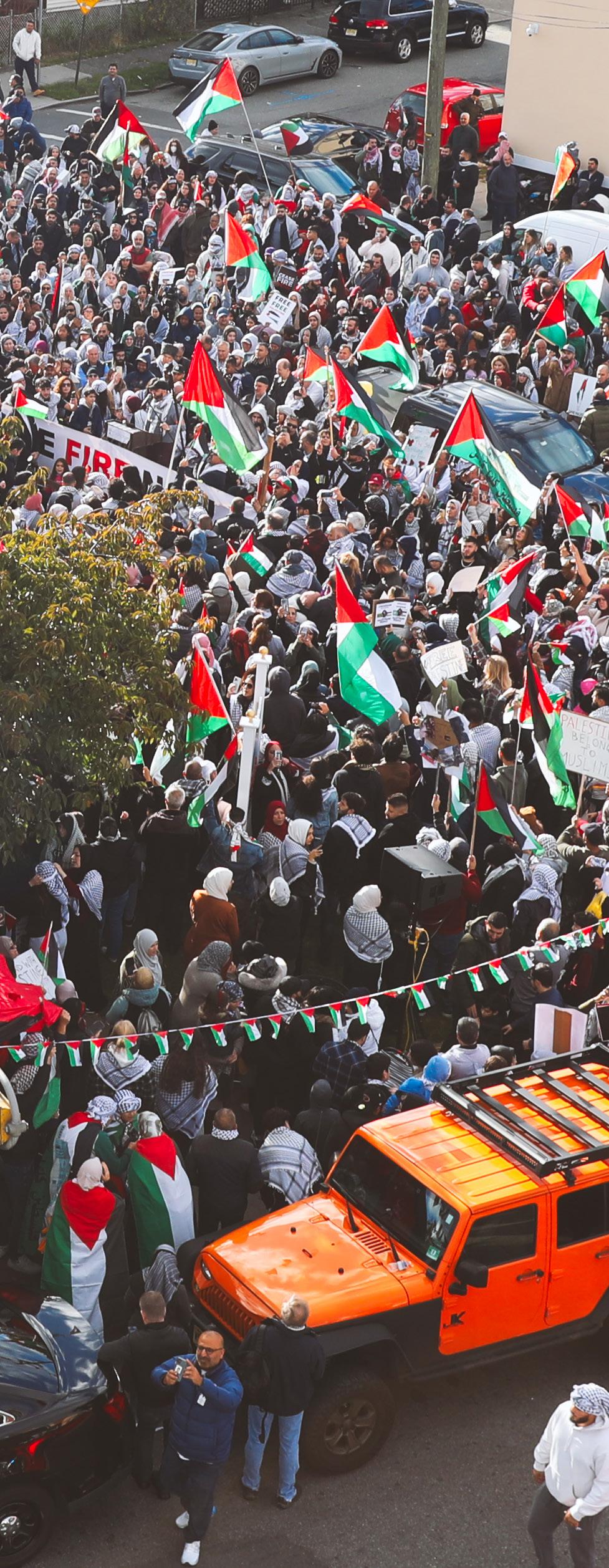
26
Picture taken by Salah Daoud IG: @sala7_dp
Spoken word
Sheikh Ubaid
By God’s will, Gaza will Live Can’t kneel with Kapernick, want us to fear massa’s whip
As they strangle Gaza Strip half the population kids, Under occupation risk, murderous stop n’ frisk, A thousand hostages
Targeting paramedic, can’t get anesthetics
They committing genocide and it’s unapologetic
Dehumanizing with pride calling us Barbarbic
Rhetoric will seal your lips, media complicit censorships, teleprompter flip the script, Summersault Tongue twist Dum yall Down eclipse
But on the gram see clips, horror apocalypse, no water can’t get a sip
Phosphorus bombs catch a drip, Press my conscious does it exist? holding by fingertips, blowing hands off wrist, So can’t get a grip Memories blown to bits like computer processing chips
Another building hit, Godzilla to the bridge
But Gaza resists by God’s will Gaza will live

27 @flyers_for_falastin
@hategekimanaj
Artwork by Julie van Hove IG:
PACC Honors Wael Al-Dahdouh
Basma Bsharat
Recently, Wael Al-Dahdouh was transferred to Qatar to receive treatment for sustained injuries while working tirelessly as Al-Jazeera’s Gaza bureau chief and leading on-the-ground journalist. The Palestinian American Community Center (PACC) was proud to honor Wael with a plaque, a humble gesture of our community’s support and gratitude to Wael for all of his sacrifice and dedication to the Palestinian cause. In the past four months, we have witnessed the unprecedented amount of loss and suffering that the people of Gaza have had to endure as the Zionist State of Israel has committed multiple war crimes, repeatedly, in the name of “self-defense.” Amongst those abhorrent violations is the targeted and systematic killing and harm that has been brought to the journalists of Gaza. Among them, one individual has stood out, time and againWael Al-Dahdouh.
In October, Al-Dahdouh received the devastating news that his wife, 15-year-old son, 7-year-old daughter, and grandson were all martyred in an Israel airstrike as he was recording a live broadcast. The very next day, he returned to work to continue reporting.
In December, while covering an airstrike on a school, an Israeli drone strike injured Wael, and his cameraman, Samer Abu Daqqa, was martyred. Still, he continued his work.
Then in January, we were all shocked to hear that Hamza Al-Dahdouh, Wael’s eldest son and a journalist as well, was targetted and martyred in an Israeli airstrike. And still, Wael continued.
In an address to the world, he said, “In the end, this does not change anything of reality, and will not change any of our decisions. We are going to proceed as long as we are alive and breathing. As long as we are able to do this duty and deliver this message.” Wael’s resilience and commitment to his work, despite the
multiple efforts by Israel to silence him, represents the dignity and honor of the Palestinian people. We extend our condolences to Wael, and pray he will be able to return home to Gaza soon, reunited with his remaining loved ones. May he bear witness to justice being served for the loved ones who were unjustly murdered. We hope to be able to see him again soon- in a free Palestine, Inshallah.
Plaque inscription:
The Palestinian American Community Center of New Jersey honors and extends its solidarity to Mr. Wael Al-Dahdouh. PACC offers its deepest condolences to him on the martyrdom of his wife, two sons, daughter and grandson, and wish him a speedy recovery. Wael Al-Dahdouh has set an example of patience, steadfastness, and adherence to the homeland, and has become an icon in the eyes of all the Arab peoples and supporters of freedom, justice, and truth.
28
يسرجوين ةيلاو يف ةينيطسلفلا ةيلاجلا حودحدلا لئاو ديسلا عم اهنماضتو اهتايحت مدقت هينباو هتجوز داهشتسا ىلع يزاعتلا قدصأب هل مدقتتو لجاعلا ءافشلا هل ىنمتتو ،هديفحو هتنباو. نطولاب كسمتلاو دومصلاو ربصلا يف لثملا تبرض دقل راصنأو ةيبرعلا بوعشلا نويع يف هنوقيا تحبصاو قحلاو لدعلاو ةيرحلا

29
Mama
Rewa from Gaza
“Mama, I don’t want a birthday party. I want to die as a whole body, not in pieces.”
On the morning of October 7, 2023, my son Majed was having breakfast before going to kindergarten, and I was sitting beside him, feeding him and saying, “Eat your eggs so you can grow up and become a strong man like your father.”
“Mama, when will I have a baby brother?” he asked, moving his hand on my belly. I answered him with a gentle smile, “Just a few more months, and then you will have a baby brother.”
I put on his shoes and told him, “The bus is coming now, wait for it a little.” As soon as I finished speaking, we heard a loud sound of rockets. I was shocked and hugged him, whispering, “Don’t worry, it might be fireworks.” I checked on my daughters, Alma (9 years old) and Mai (7 years old), who were sleeping and woke up to the sound of the rockets. Then I went to turn on the news and saw that it was an announcement of war, and men from Gaza had entered the settlements.
My daughter Alma asked me, “Mama, what happened? Is this a war? Will my friends die like what happened in the previous war?” I answered her, “What happened is a reaction to anyone who steals someone else’s land. If you hear anything, just know that there is a bigger story to what is happening. These people came to our land, stole it, and settled in it long before today. They consumed its resources, exploited its land, and left us struggling in poverty. It is our right to reclaim these lands and live like other countries, with the right to travel, play, and enjoy all other human rights.”
We sat down, and Majed took off his kindergarten uniform. I told him he had the day off. After a few hours, I had an online lesson; I am an Arabic language teacher for non-native speakers. I said to myself, “I don’t want my life to stop every time we
have a war. I will continue my professional career.” I opened my laptop and started the lesson with Rania, who is a British student I teach. As I asked her how she was doing, my husband came in with tears in his eyes. He said, “Rawa, turn off the laptop. Your cousin Abdullah was martyred.”
I stared at him in silence and said, “What? Abdullah was a civilian working in agriculture. How did he die?” He replied, “While he was working in the field, he and his coworkers were killed.” I apologized to Rania and told her, “There is a war in Gaza, I can’t continue the lesson.”
I went to my uncle’s house and found his mother, who was suffering from cancer, close to death as she screamed about her eldest son. I learned that many men had been martyred already. But this was only the beginning. All possibilities were mere speculations because the enemies did not understand the language of dialogue or freedom. They came here and brought with them people from all over the world, of different nationalities, to settle and colonize our homes. This was always the goal.
At night, the airplanes didn’t leave us any space to sleep as they circled above our heads and bombed. We couldn’t close our eyes at night, not even for a second, and with every missile that fell, the sky would light up in red, and the house would shake as if it were an earthquake beneath us.
My children asked me, their eyes heavy with sleepiness: “Mama, what is this?” I answered them, “It’s fireworks.”
“What kind of never-ending fireworks show is this? How long will you lie to us, Mom? Tell us it’s a war and that the Israeli army is bombing us to death and taking our land,” my daughter Alma said.
They were right. How can I teach them that lying is not acceptable and that we cannot lie to each other? There must be trust between us, even if the truth is difficult.
30
*Continued on page 32

31
Artwork by Ceyza Amera IG: @ceyzaamera
The next morning, as I prepared breakfast for them, I told them that this was a war and that there were no schools or classes until the war was over.
The shelling was intense and severe; no words can describe it. It was incredibly powerful, and every minute, dozens of homes would be bombed, with no prior warning, right over the heads of their occupants.
Then there was no electricity or internet. There was no drinking water or water for washing or in the bathroom. The children cried from thirst, and I looked at them and cried too. There was nothing I could do for them. Even the bread, the only thing to feed them, was stale and unfit for consumption, but they still ate it out of hunger.
One night, when the planes were bombing the city of Al-Rimal (a once-developed and vibrant city in the Gaza Strip), the shelling was intense. The bombing seemed like an unending chain. I felt a severe pain in my abdomen, and something happened to me. It was then that I knew I had lost my fetus. We went to the hospital at night, but there were no doctors to attend to me. The number of casualties and patients exceeded the capacity of the doctors and nurses. I saw the dismembered bodies and the remains of children, their features distorted, but their childhood innocence still hugged them.
I saw a child saying goodbye to his mother, and another mother saying goodbye to her child. A father was crying over his child, and a child was crying over his father. There, I witnessed something that would stay with me for the rest of my life.

32
Palestinian Women and Cities Until 1948’ Artwork by Aliaa Abou Khaddour IG: @aliaa_abou_khaddour
We returned home without receiving any treatment, and as we got into the car, a rocket fell near a hospital, targeting journalists who were conveying the truth to the world. My husband’s hand was injured, and as we were there, he got out of the car to seek medical treatment. The doctor told him, “Your injury is minor, and there are others who need medical equipment more than you.”
On the morning of the following day, October 13, 2023, my daughter Mai woke up to tell me, “It’s my birthday today, Mama, and you promised me that if I got full marks in my exams, we would celebrate and invite my friends.”
In the evening of the same day, I received a call from my mother. She spoke to me with anguish and told me that my cousin’s family was bombed. He, his wife, their three children, and his sister all died. They couldn’t find all their body parts; they only found his wife’s hand and the skull of their youngest son. They found his sister’s leg lying on a neighbor’s rooftop. The rest of the body parts and corpses will be searched for after the war ends, as the ambulances had no fuel to go to the location.
I was devastated by the news and the imagery that came to mind. I started crying and went to my bed, covering my face. My hands were trembling, and my whole body was shaking. A small hand held onto mine, and my daughter, Mai, whispered, “Mama, I don’t want a cake and a birthday. I want us to be corpses when we die, not dismembered.” Imagine that the greatest wish for a little girl on her birthday is to be a corpse rather than a mutilated body.
After a moment, my husband came to tell me that we would have to leave our home and migrate to the south because the northern areas were being threatened with evacuation. I packed a bag, and then my son, Majed, asked me, “Are we leaving our home?”
Here, I had two choices: either to go and sleep on the street or to stay in my unsafe home. It wasn’t an easy decision. I didn’t know what was best but was confident that following the enemy’s choices would
be the worst option. So, I chose to stay in my home under the danger.
For now, I still live in my home with my children, in constant danger, because there is no safe area in Gaza.
This is just the experience of one woman living in Gaza, but there are many mothers like me, many mothers who have lost their children, and children who have lost their mothers. Countless others have lost their homes and places of shelter. Is it not our right to live in safety? Is it not our right to die with dignity? Is it not our right to defend ourselves and our land that was taken away from us?

33
Picture taken by Salah Daoud IG: @sala7_dp
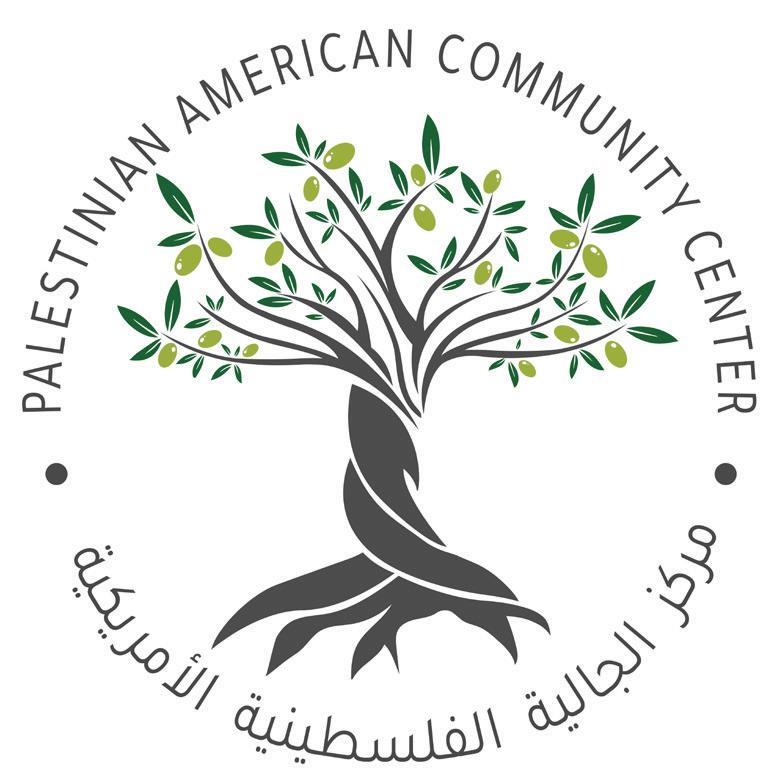
34
you like to see your advertisement next? Contact us now! www.paccusa.org 388 Lakeview Ave, Clifton, NJ 07011
Would

35
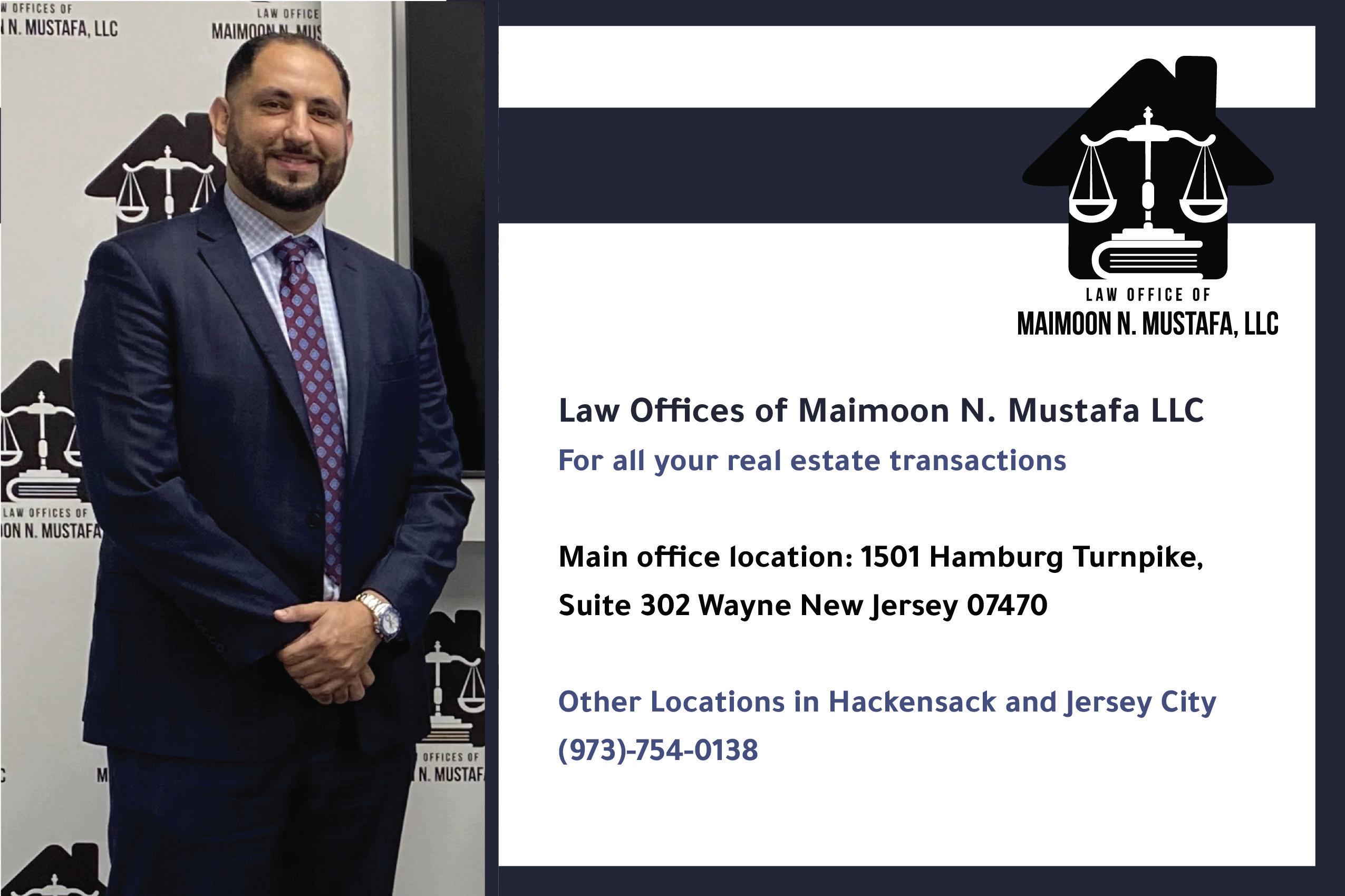


36
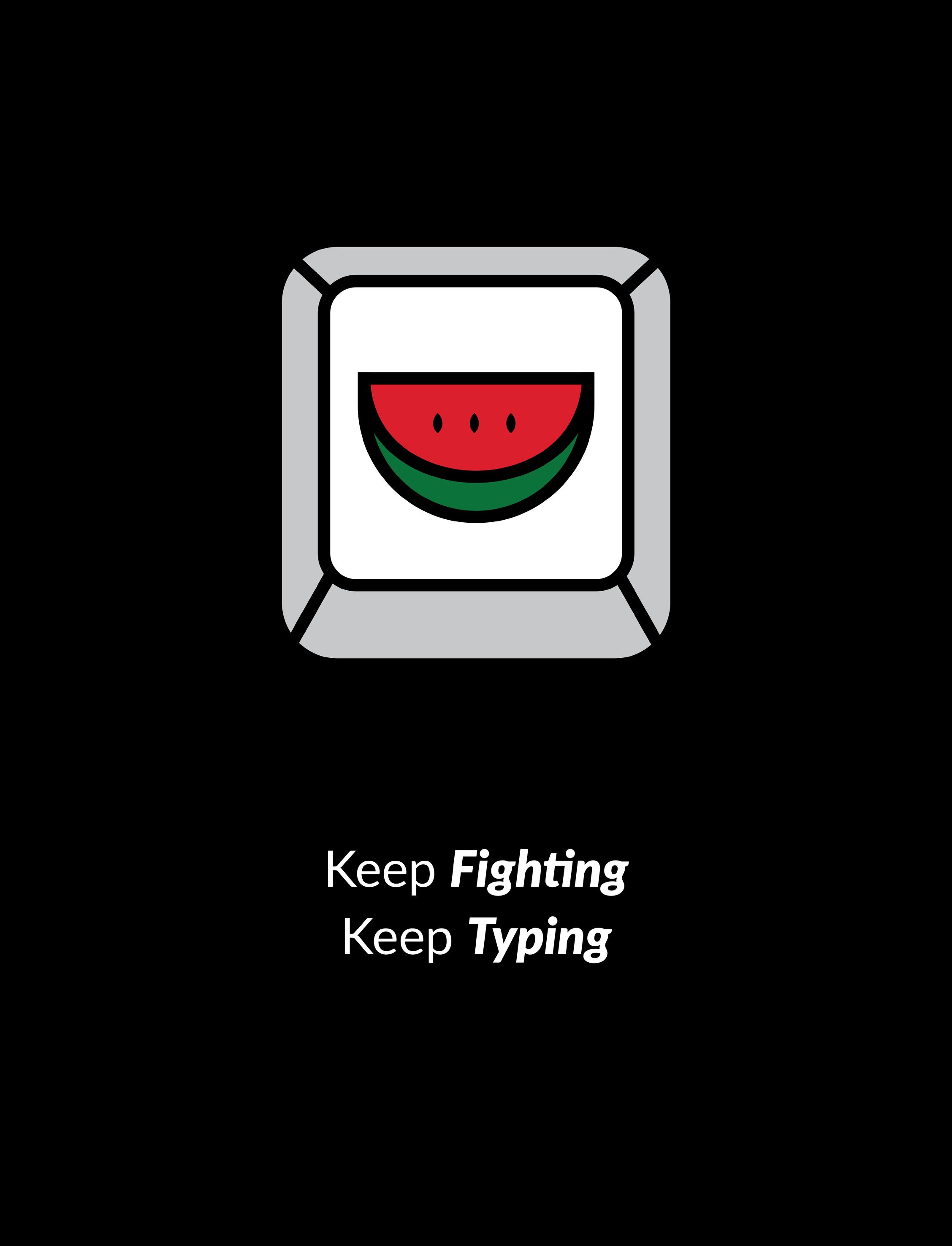
37
Artwork by Amal Jamaludin
IG: @amal.jamaludin
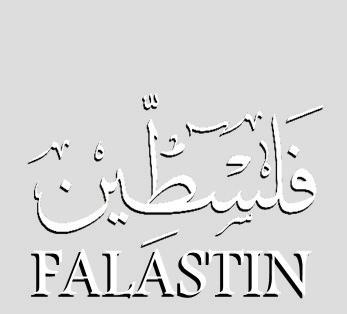
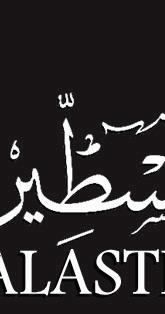




38 24







































